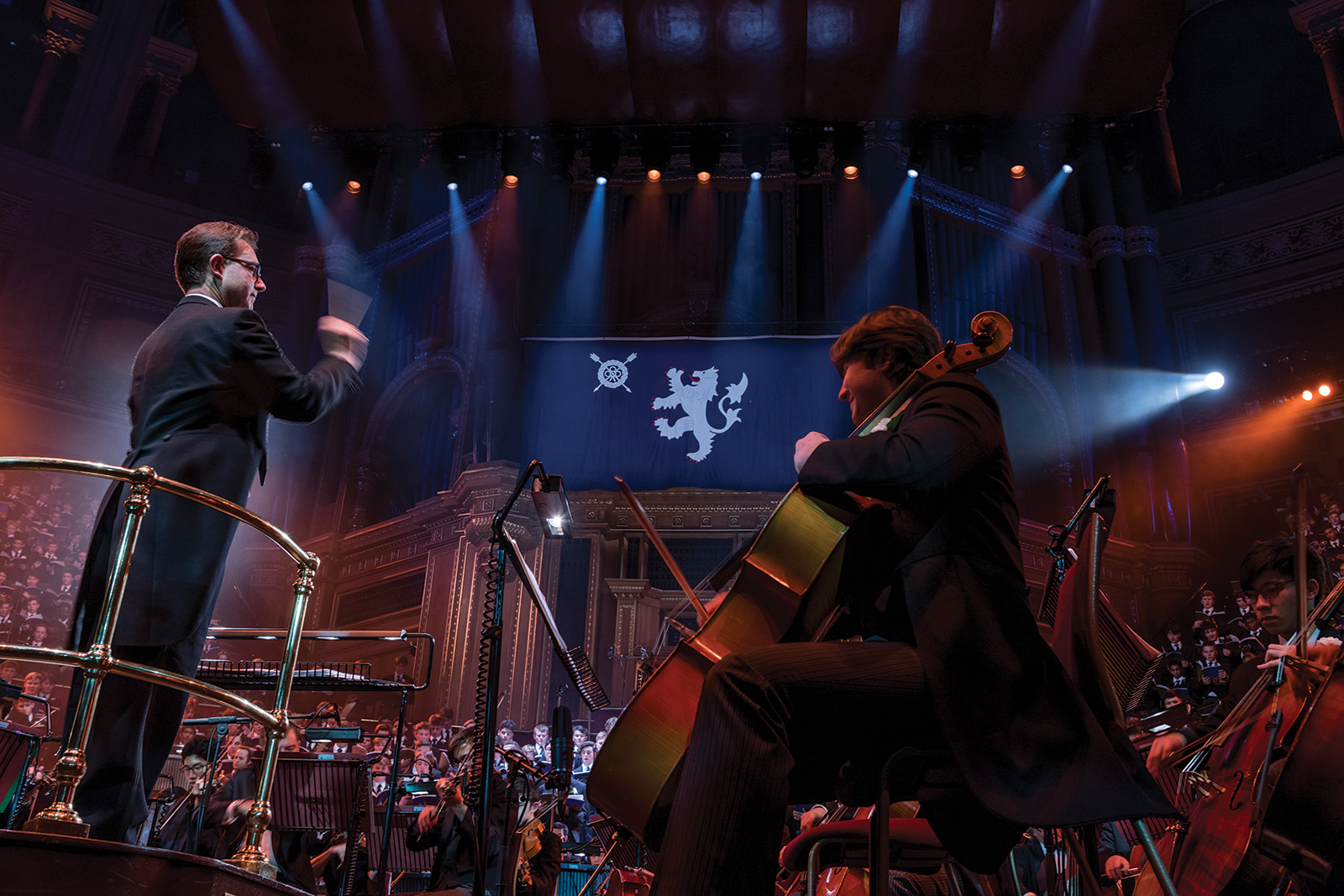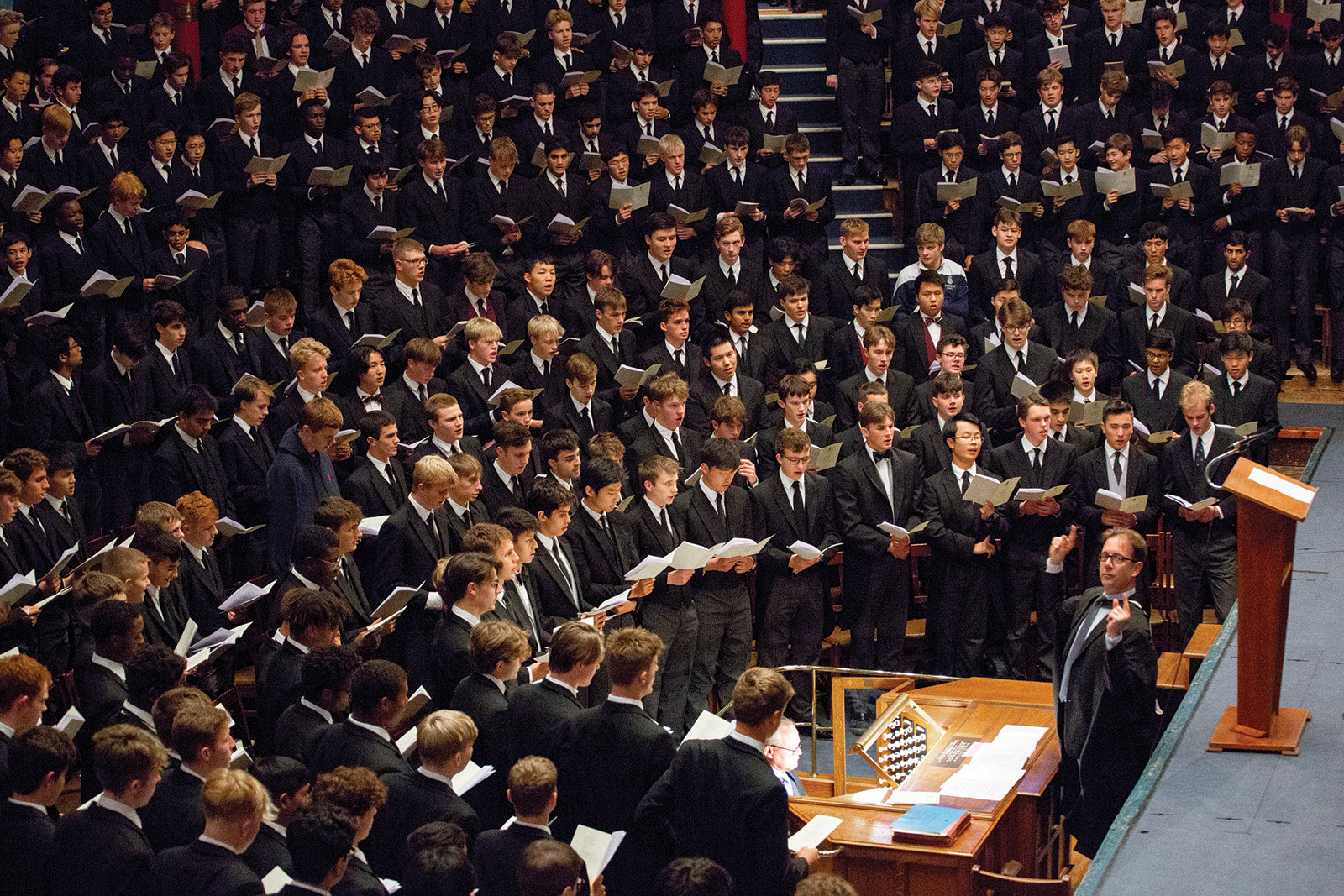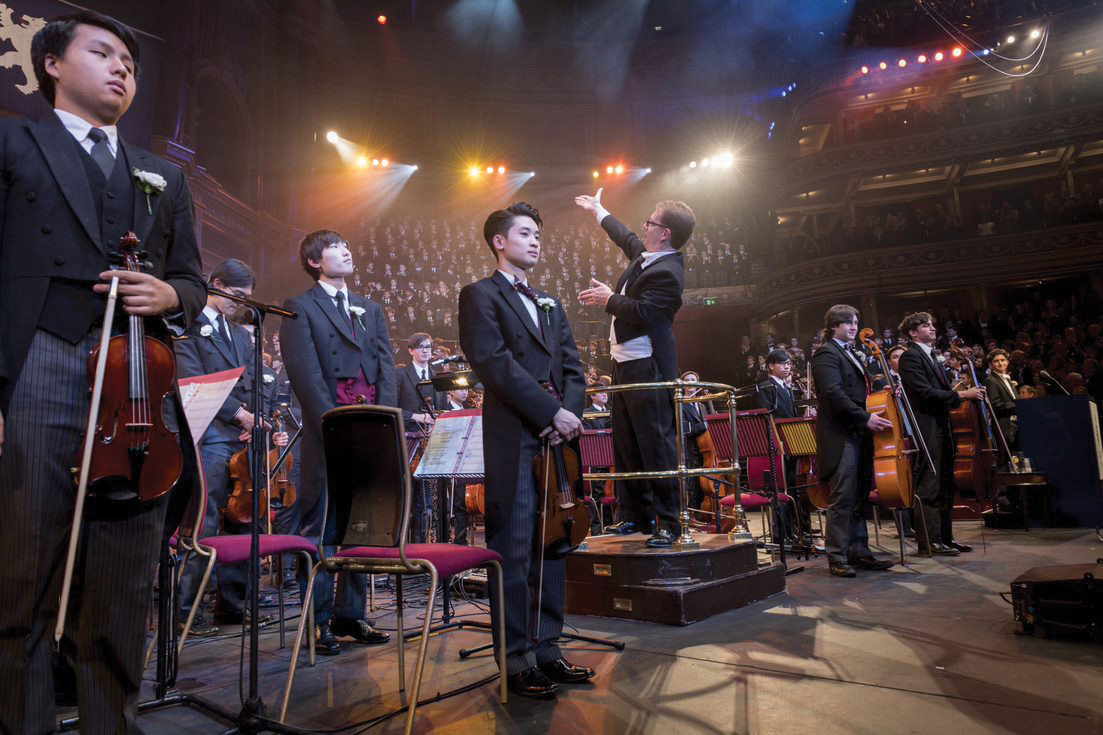Vantage Music | November 2020 | London
Vantage Music is grateful to have the opportunity to have an interview with Mr. David Woodcock, Director of Music at Harrow School for the last 15 years.
Mr. Woodcock, you have been involved in choral activities since you were young. How did it happen?
I suppose I was very lucky to have a musical father who was an organist, and I think from the age of four I was allowed to sit next to him at the organ bench and munch my way through his mints! It felt like an eternity until I was finally allowed to join the choir and start piano lessons on my seventh birthday. I didn’t sing in his choir for long, though, as I soon found myself successfully auditioning for the choir of Canterbury Cathedral. My experiences there as a chorister under the great Dr Allan Wicks have shaped my musical life ever since. I was lucky enough to study the organ with him, and returned to the cathedral as organ scholar at the tender age of 16 and completed two years in that position, as well as deputising regularly in the choir as a bass before going up to Cambridge.
You were studying at Cambridge University, reading music. Was there anything you learnt from there that you could apply to your students today?
I think only that we never stop learning, and to embrace the idea of keeping one’s mind open. I think when we are young we can develop fixed ideas about how to do things (musically or otherwise) based on little or no real experience. I was very lucky in my time at Cambridge to be surrounded by some wonderful peers, and inspirational directors of music and university lecturers.
What inspired you to get into music education?
It is the act of rehearsing and educating that keeps me inspired every day to be a teacher. Some musicians will freely admit that they do not enjoy the process of rehearsal. I love it. Yes, it is hard work, but in music a true artist has to have something to say. Trying to get any ensemble to deliver an artistic vision requires a lot of sculpting and moulding. With professionals it is enough of a challenge to give the impression of a unified message without suppressing each individual’s musicianship; with young people there is so much to think about in every rehearsal. People often ask me how I plan rehearsals. The honest answer is I can’t, so I don’t (beyond having a wishlist of what I might hope to achieve).
Has music been important in your personal development? Why?
Undoubtedly. I can’t imagine a life without music; it has shaped me.
Do you think music is an important part of the development of a child? Why?
It can play a very important part in the development of a child, if it is introduced to them in the right way. I could talk about this subject for hours. I think the most important advice I would give to parents and leaders in education would be to let children embrace music from a young age.
Has your philosophy in education evolved over the years since you’ve been an educator?
Yes and no! I think over the years I have learnt to be much more inclusive… but I have never wavered in my commitment to standards.
You taught in Oakham School and have been at Harrow School since 2005. Have these schools influenced you in some way?
I have been very lucky to work at two such great, yet very different, schools, and to work for some inspirational educational leaders. I suppose what I have learnt in the 25 years as a director of music in these places is that my job is to ‘enable’. If I can enable my colleagues to do their jobs to the best of their abilities and enable students to reach their potential, then I am very happy.
You were one of the tutors at the Early Music Academy, held at Cheltenham College this summer. What is this summer course about? Would you like to tell us more about this?
These courses were born out of a collaboration with Peter Phillips (director of the Tallis Scholars). Back in 2000 we set up the Tallis Scholars Summer Schools in Oakham; it was really an accidental creation on the back of a workshop we ran together. These courses ran for 15 years in the UK, USA and Australia, with singers of all ages from literally all over the world. I now run these courses with soprano Jan Coxwell and Andrew Carwood (director of music at St Paul’s Cathedral in London and of the Cardinall’s Musick) under the new banner of the Early Music Academy, with UK courses in Cheltenham and US courses in Boston. These courses are dedicated to exploring Renaissance polyphony. It is a wonderful way to spend a week, and I enjoy working with amateur musicians.
What do you find rewarding as a music educator?
I love the daily challenge of dealing with different students, responding to their needs, helping them to fulfil their potential.
What is your personal philosophy in terms of music education at the school?
Well, it is easy to focus on the top musicians and how we meet their needs and help them to thrive and flourish with the opportunities we provide for them and the excellent tuition they receive from my colleagues, but it is essential that every boy is in some way touched by music in their time at school. I would like to think that every boy leaves the school with some happy musical memories. We have some pretty special traditions, which go some way to ensure that every boy is involved in the musical life of the school.
* On education at Harrow School *
At the school, what is the biggest struggle that students have in their music education?
I think this would be the same in any school, but it is hard for boys to find enough time to practise.
What support could the school provide the music students? Anything effective in particular?
Firstly, we are very lucky to have an excellent team of nearly 50 music teachers who are dedicated and experienced teachers and performers. So the boys are in excellent hands in terms of their teaching.
For our youngest music scholars, we have supervised practice sessions early in the morning. I love the fact that the Music Schools are alive with sound from about 7.30am in the morning. Our practice supervisor is always a music graduate who goes round and checks the boys are practising and helps them devise efficient practice methods.
Beyond that, our main ‘support’ is all about finding opportunities for the boys to perform as much as possible in a wide variety of genres and settings.
How important is music performance for the school in general?
For me, music is all about performance. This is why we do it. Boys may, of course, prepare for exams, but many more are always preparing for a concert of some sort.
Music performance plays a big part in the music students’ lives at the school – what sort of exposure do they get? There are more than 80 concerts a year with numerous ensembles in the school. How effective are these in terms of shaping the students there at Harrow? What other performing opportunities are available for the students?
There is an almost astonishing wealth of opportunities for musical performance here. In an average year there are something like 80 musical events. These range from large-scale concerts in the Speech Room, with literally hundreds of performers, to regular concerts in Music Schools, weekly lunchtime recitals in St Mary’s Church (often performed by just one boy), to house concerts. Some of my favourite concerts are the informal concerts, where a beginner might take their first step as a solo performer alongside performances from experienced diploma holder or music award holders. For the most talented performers, the aim is to perform in our annual concerto evening with a professional orchestra.
We regularly share our music with audiences away from Harrow, both nationally and internationally. In the last three years the Byron Consort, Big Band, String Orchestra and Chamber groups have visited North America, Russia, Scandinavia, China, Thailand, Hong Kong and Singapore, literally performing in some of the greatest venues in the world.
I probably can’t quite say that we cater for every musical taste, but the range of music-making is impressive: classical (from mediaeval to contemporary), jazz, rock music – we have our own recording studio, and boys enjoy joint rock concerts with girls’ schools – musical theatre, bagpipes, early music… it is an endless and ever-changing list!
Can you tell us something about music competitions at Harrow School?
For boys unable to commit to regular school ensembles, house music competitions enable an even wider engagement in collaborative music-making. Now, generally speaking, I am not a fan of competitive music-making, but at Harrow it is almost an art form and I believe a real strength. House loyalty means that boys take all competitions incredibly seriously. The focus in the first half of the autumn term is inter-house singing. Each house enters an unaccompanied close harmony group (typically four to ten in number and called a glee), and a unison song performed with piano accompaniment (by 12 boys, thus called a Twelve!). These competitions, known as Glees & Twelves, expose the whole school to 90 minutes of live music-making – some of it very serious, high-brow music, along with some songs from shows and chart hits! The responsibility shouldered by senior boys in directing groups and organisation gives them invaluable experience that we could not usually offer them with ‘school ensembles’. In the spring term, we have an inter-house instrumental competition. There are three rounds, one for soloists, one for chamber music, and one for large ensembles. Some houses regularly enter large ensembles with more than 25 boys. Again, the industry that goes into preparing these performances, arranging music and directing ensembles, is a joy to behold…
In the summer term, as we head towards the music prizes that are available for each discipline, we hear every boy in the Music Schools.
Every boy who leans an instrument has to perform in the preliminary rounds of the music prizes (I am pretty certain that no other school can say that every boy performs once a year!).
If the school is to give a music student one piece of advice, what would it be?
Practise!
Will any future projects (disclosable to the public) be undertaken at the school in the upcoming future?
Uncertain times, but we have major tours planned to the USA for December 2021, and two tours to Asia in 2022. We will also be celebrating our 450th anniversary in 2022 and there are some pretty spectacular events in the planning stages for that.
At the moment, it is about finding performance opportunities for our ensembles that are safe!
There are many music scholars intakes a year. Indeed, it is pretty outstanding. What support does the school facilitate to further their development?
We currently have more than 70 award holders in the school. We make between 10 and 15 awards each year. Some of these boys might make music their life, but most of them are really good all-round students. As I mentioned earlier, when they first arrive we make sure that they are practising regularly. Of course, we also want them involved in as much music as possible. Solo performances, larger ensembles, chamber music. The music scholars are busy, but they love it…
What sort of repertoire are the students working on now? How do you decide what music is appropriate for a student?
As I walk round the department I hear a huge variety… teacher and pupils discuss what they will work on. At the moment there are a number of boys studying and practising concertos, some Bach cantatas.
Within Harrow School, are the students engaged in any personal projects related to music? If so, what are they?
All the time… composition, writing about music, reviewing concerts, practising for concerts, preparing for concerts and auditions.
According to the school’s website, the Song Book seems to be something special for the school. What is it and who contributed these songs to the school?
Well, singing is the heartbeat of Harrow and this means that music is literally a part of every boy’s life and every boy is part of Harrow’s musical life – they can’t really escape music!
Some schools have a school song, which they may or may not sing these days. Here we have the unique tradition of our Song Book and the associated traditions of new boys’ solos, songs and concerts in houses and song concerts, here in the Speech Room. About 35 of these Harrow Songs (which can only be written by the directors of music!) are still regularly performed and my greatest privilege as director of music is to lead the school in singing for Churchill Songs, an annual event that commemorates a visit from our greatest Old Harrovian in the darkest days of the 1940s to be cheered up by a performance of Songs from the boys. I can’t argue with Churchill’s comment that Songs are our ‘most priceless treasure’. Usually Songs take place here in the Speech Room, but every five years we fill the Royal Albert Hall and the school performs to more than 5,000 parents and OHs. Songs are just one of the traditions that bind us together as a community.
With COVID-19, how are the school, teachers and students adjusting to the music performance, e.g. more online live broadcasts and/or recording?
During the first lockdown, all of us adapted very quickly to learning and teaching online. We recorded lots of concerts online. Currently almost all the teachers are back teaching face to face, and most of our ensembles are rehearsing and performing, albeit in reduced numbers. It has been a good opportunity to explore baroque and classical repertoire and focus even more on chamber music.
It seems that you have been a visitor/guest professor in different schools and educational institutions in the world. Would there be anything where you think Harrow School stands out comparatively and that you may want to encourage these overseas educational institutions to do?
One of our particular strengths is chamber music. We usually have at least 15 groups rehearsing at any one time. The musical skills that boys learn in this environment are essential to everything we do, and the soft skills that they learn without even realising will stay with them forever, and stand them in good stead for whatever career or vocational path they follow. Working in small teams is something we all need to do efficiently and effectively.




